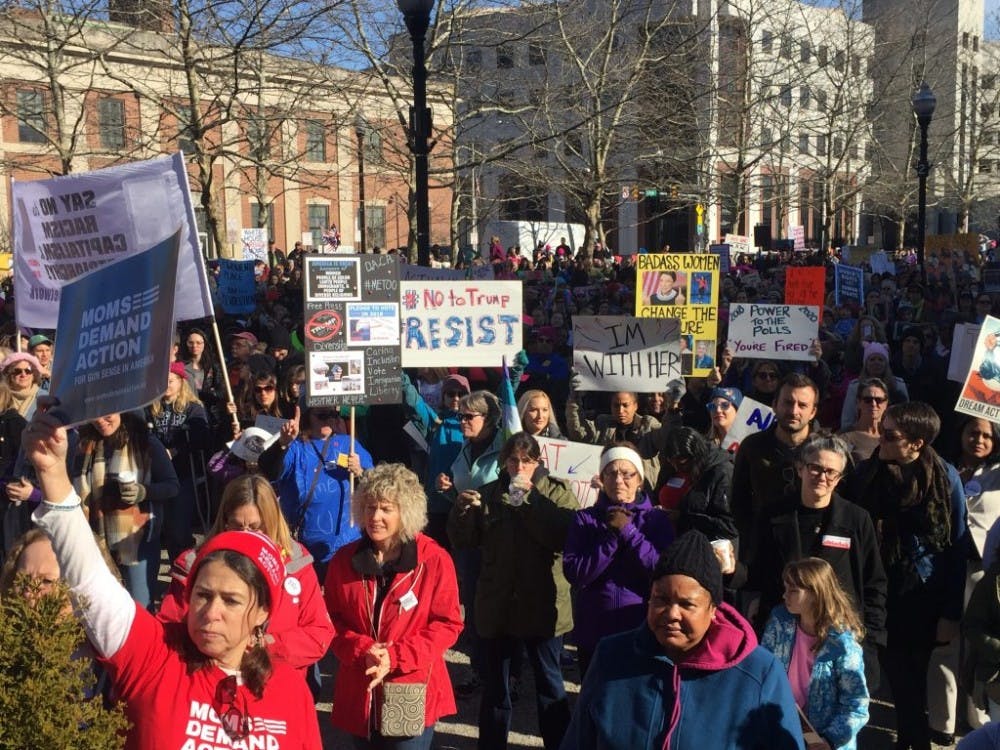Hopkins students gathered alongside thousands of Baltimore residents in the War Memorial Plaza on Jan. 20 to take part in a protest commemorating the first anniversary of the Women’s March. Protesters in cities across the country donned pink hats and hoisted signs calling for women’s rights.
This year’s march, called “Power to the Polls,” focused on encouraging Americans to vote in the 2018 midterm elections.
Many activists have also stressed the importance of standing in solidarity with marginalized groups like undocumented immigrants, women of color and the LGBTQ community.
Senior Taylor Veracka said that she appreciated the diversity of voices represented at the March.
“It was really great to see a ton of different women come together,” she said. “It was nice to hear from so many different people in the Baltimore community that I didn’t necessarily know of before or hadn’t heard speak.”
Freshman Sabrina Epstein organized a group of students to attend the March, including several members of Hopkins Feminists.
“Leading a group of Hopkins students to the March was incredibly energizing,” she wrote in an email to The News-Letter. “I hope my peers were as inspired to become more active in the Baltimore community as I felt.”
Political figures, activists and other prominent female leaders spoke at the rally. State’s Attorney Marilyn Mosby and Mayor Catherine Pugh were among the speakers.
Mosby is the youngest chief prosecutor of a major American city.
“Warrior women, we are here today, standing united,” she said during her speech. “We as women are the foundation of our communities.”
Melanie Hood Wilson, a graduate of the Community College of Baltimore County, also spoke at the rally. She said that recent cultural shifts like the #MeToo movement, which calls attention to the scope of sexual harassment, and Time’s Up, a coalition of women fighting sexual harassment in Hollywood and other industries, put feminism in a global spotlight.
“This was the year feminism went as mainstream as it has been in my lifetime,” she said at the rally. “Intersectionality has risen from the obscurity of feminist academia to a commonly used phrase, a rallying cry, a demand for our inclusion and a recognition of our value.”
Many of the speakers called for action. Mosby stressed the importance of community leadership and organizing.
“We are not just going to march today. It’s time to strategize, it’s time to implement,” she said. “We will fight for better schools for our children. We will fight for safer communities for our family. We will fight for better wages. We will fight for more opportunities for every girl to realize her God-given potential.”
Veracka said it was important for continued activism because change would not necessarily happen fast. She added that the 2018 midterm elections were of critical importance.
“There’s so much potential for change in smaller levels of government,” she said. “Change in Congress and state governments and City Hall — it’s tangible. The more people that we can get elected who are going to make good change, the better it will look in the future.”
Maryland Senator Ben Cardin urged participants of the March to vote in the next election.
“We need the March, the movement, to have that wave at the ballot box in 2018 so that we can win back the United States House of Representatives and the United States Senate and get up at the work of all the people of the United States of America,” he said.
According to Veracka, this year’s March differed from the first demonstration in 2017, because it focused the anger of its participants toward a clearer mission.
She added that the first March closely followed President Trump’s inauguration.
“It was only a couple of months after the election and everyone was still so upset and it was raw,” she said. “They’re trying to turn the focus to be something more productive rather than just expressing ourselves. They’re encouraging people to get out there more and work together in the community.”
Epstein wrote that political representation is important for a diverse range of women. She referenced the recent Time Magazine cover, which depicted the faces of dozens of women running for office this year.
“A woman running for my own congressional district, which has never been represented by a woman, was included,” she wrote. “I hope this movement leads to more representation for women and non-binary individuals in government, because that is valuable progress.”
Epstein also called for greater representation of women with disabilities.
Freshman Madeline Amonick agreed that greater political representation is important for women in marginalized communities.
“I would love to see more representation of women of color and LGBTQ individuals in positions of power,” Amonick wrote in an email to The News-Letter. “People need to recognize the absolute need for intersectional feminism, and the best way to embrace that is promoting these groups of women and non-binary people.”
She identified herself as a feminist and added that some people who stigmatize the feminist movement do so because they are uncomfortable with the movement’s goals.
“Feminism is about equality, and if you believe in equality then you should be a feminist,” she wrote. “I can’t stand those who are uncomfortable with feminism, because for me it comes off like they are comfortable with inequality and injustice.”
Veracka said that, despite the organizing from Hopkins Feminists, she was disappointed in the turnout from Hopkins. She said that it was important for Hopkins students to be more involved in community activism.
“It definitely felt like Hopkins was less mobilized than last year,” she said. “With such a large presence that Hopkins has in Baltimore, if you think about the various levels of privilege the students here on campus have, it’s important for us to at least show support.”





